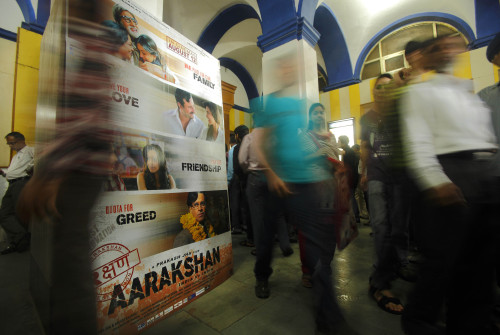NEW DELHI (AP) ― A star-filled Bollywood film on India’s caste system churned up passionate debate as it opened Friday, with angry lower caste groups trying to torpedo its release, saying it reinforces social prejudices against them.
The furor makes clear that caste ― the millennia-old Hindu custom that divides people in a strict social hierarchy based on their family’s traditional livelihood and ethnicity ― remains a deeply sensitive subject in modern India, despite government programs to erase such distinctions.
 |
Ticket seekers wait outside a cinema hall screening the Bollywood movie “Aarakshan,” or “Reservation” in New Delhi, India, Friday. (AP-Yonhap News) |
At least three big states have banned the film “Aarakshan” from opening on schedule Friday over fears it could stir up caste tensions. Its director, Prakash Jha, filed an urgent appeal to the Supreme Court seeking to overturn the bans.
The film’s stars were given police bodyguards, and police also guarded theaters that did show the film, searching moviegoers and barring them from bringing bags inside, authorities said.
The movie’s title means “reservation,” a reference to affirmative action quotas for India’s untouchables, also known as dalits, in jobs and education.
Dalits, who form nearly a fourth of India’s billion-plus population, say the film belittles them and shows them in a negative light.
Jha disputed their interpretation of his movie, but he agreed to edit out parts they may find offensive. The edited version, however, was not available as it opened across the country over this lucrative Independence Day three-day weekend.
The film’s star, famed actor Amitabh Bachchan, sounded anguished on his Twitter account Friday, accusing people of condemning the film without even watching it.
“Have cried at our helplessness in not making people understand that this art needs to be seen not banned!” he tweeted.
On his blog, Bachchan quoted his character in the film, the principal of a college: “Two Indias reside in this country ... and in truth, if we have to see any progress in our society, then the distance between these two Indias must be erased.”
Caste discrimination runs deep in India despite government efforts since independence in 1947 to use affirmative action to wipe it out. India’s economic boom has further sharpened the divide, with much of its dividends accruing to the upper castes.
Nevertheless, large sections of India’s upper castes are incensed over the quota policy, which ensures lower castes get spaces in the country’s highly sought-after medical and engineering schools, universities and jobs.
“Aarakshan” had created a buzz, with the films lead actors ― also including action hero Saif Ali Khan and Bollywood starlet Deepika Padukone ― traveling the country to promote its release.
In the film, Bachchan plays the idealistic head of a college who ends up being pushed out amid tensions between dalit and upper caste students over the quota system.
Another objection raised by some lower caste groups is that the Dalit protagtonist, is played by Khan, who belongs to an erstwhile royal family in India.
“This objection is unfair. By this logic, are they saying a Dalit cannot play the role of a king in a film?” asks Jha.
With dalit groups saying the film is biased against the quota system, the government of Uttar Pradesh, India’s biggest state, banned the film Wednesday. A day later, the governments of Punjab and Andhra Pradesh followed suit.
The ban could cost the film more than 150 million rupees ($3.5 million) in earnings, as filmgoers were expected to crowd theaters over the long weekend, trade analysts said.
A government panel for the welfare of lower castes also has asked the country’s film authorities to review the clearance given to the film.
“We have written to the Censor Board to review the film and remove at least five objectionable dialogues from the movie,” said P. L. Punia, who heads the panel. “These changes can be made without affecting the narrative of the film.”
Another objection raised by some lower caste groups is the casting of Khan, who belongs to one of the royal families that previously ruled parts of India, as the Dalit protagonist.
“This objection is unfair. By this logic, are they saying a Dalit cannot play the role of a king in a film?” asks Jha.
Meanwhile, the Mumbai film fraternity is closing ranks in support of the movie.
“There is nothing objectionable in the film. When people see it, they will realize that there is nothing controversial,” said Ajay Devgn, a leading Bollywood action star.







![[Today’s K-pop] Blackpink’s Jennie, Lisa invited to Coachella as solo acts](http://res.heraldm.com/phpwas/restmb_idxmake.php?idx=644&simg=/content/image/2024/11/21/20241121050099_0.jpg)
